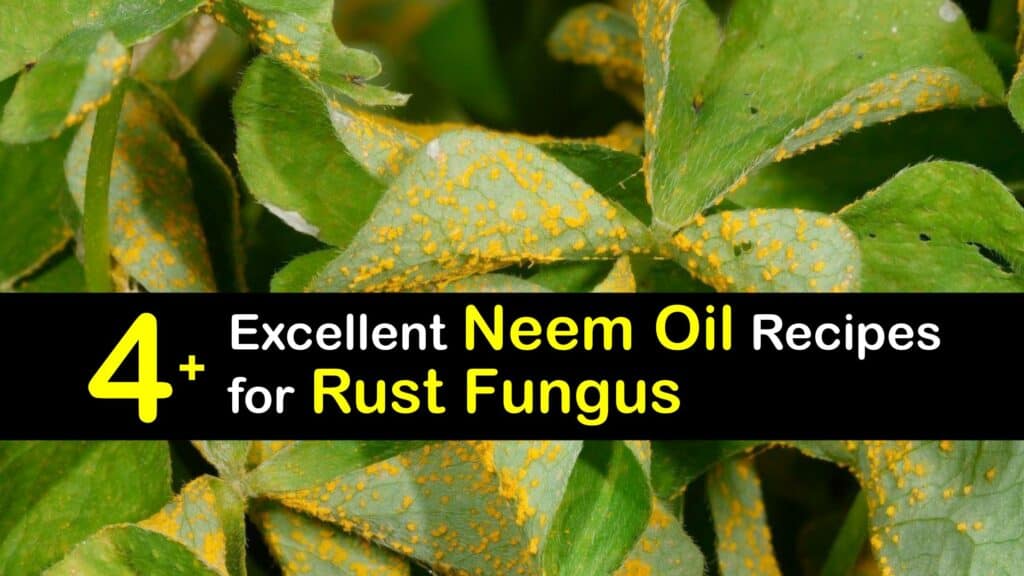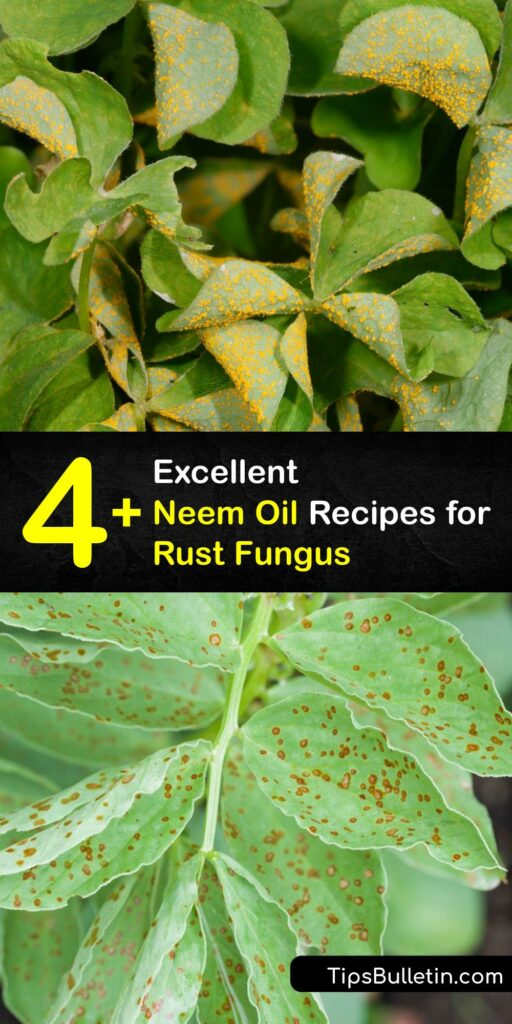Plant rust covers a relatively diverse family of fungi that damage all plants. Rust fungi are simple to spot – note rust-colored plant stems and leaves. Learn how to use neem oil for rust fungus, and never worry when this common fungus shows up in your home garden.
The rust initially appears as specks and then develops into lumps. The underside of the plant’s infected leaves also shows signs of plant rust. Using cold pressed neem oil to kill rust fungus is an intelligent way to eradicate the fungus without bringing harmful chemical fungicides into your garden.
Neem oil is a naturally occurring oil made from pressed components of the neem tree. It acts as an all-natural fungicide and insecticide. Performing rust fungus control with neem oil is an ideal way to control the fungus in organic gardens or to destroy it without harming beneficial insects.

Trust Neem Oil to Kill Rust Fungus
Understanding how to use neem oil for rust fungus gives you an effective method of mold control and peace of mind. When you use neem oil to kill rust fungus, don’t worry about spraying toxic substances on your flower or vegetable garden or insecticides harming your family, pets, or the environment.
Fungal disease is a challenge most growers face at some point, though a wet climate is often a precursor. Explore the benefits of neem oil insecticide, and rest assured that if plant rust strikes, you’re ready.

Does Neem Oil Kill Rust Fungus?
If you practice organic gardening or prefer natural products for your crops, you’ve likely wondered, “Does neem oil eliminate rust fungus from a plant leaf?” The answer is yes.
Thanks to the active ingredient Azadirachtin, neem oil is an efficient natural insecticide and fungicide. A neem oil treatment destroys fungal spores and halts the infestation, limiting its toll on your plants, whether you are spraying neem oil on tomatoes, pepper plants, or squash vines.
How to Use Neem Oil for Rust Fungus
Soil soaks, also referred to as neem oil soil drenches, are currently the most efficient neem oil treatment method. The solution soaks into the ground, where the plant roots absorb it.
Neem oil has a systemic fungicidal effect since it is absorbed by the infected plant and works from the inside out. Unlike topical applications, pollinators cannot come into contact with it.
Because pure neem oil contains powerful active components that can burn leaves, it is best utilized as a soil drench on sensitive plant life.
Add two to three cups of the neem soil drench to the soil around the roots of each plant. Repeat every two weeks to attack an established infestation. Drenches are non-toxic and ideal for use on crops close to harvest without any negative effects.
A drench can stay in the plant for up to 22 days. On large plants or trees, soil soaks are more practical and time- and labor-saving than sprays.
Apply this mixture in larger quantities for your lawn. Make your own neem oil-based grass fungus spray and add it to a garden sprayer for your yard.
Use Insecticidal Soap and Neem Oil to Kill Rust Fungus
An insecticidal soap and neem oil spray is an effective treatment for rust fungus. This easy recipe delivers neem oil concentrate directly to where your plant needs it when used as a foliar spray – on its infected leaves and foliage. Like neem oil, insecticidal soap does not deposit toxic residue, so it’s safe for the garden or houseplants.
Disperse the solution using a spray bottle or a sprayer. The plant leaves should be covered entirely, paying attention to the undersides and crevices. Avoid spraying the actual blossoms when using the spray as a fungicide on flowering plants.
To ensure the mixture diffuses before any beneficial pollinators visit the garden, spray your infected plants at the beginning or end of the day. If you don’t have access to insecticidal soap, use dish soap in its place.
Other Pests and Illnesses Treated with Neem Oil
Neem oil addresses more than just a rust infestation. This broad-spectrum fungicide is also a natural insecticide that destroys various fungal infections and insect pests. Neem oil repels flies and mosquitoes, and a host of other bugs and plant problems you may encounter during the growing season.
When you notice trouble in your home garden, trust neem oil for your pesticide and fungicide needs. Neem oil is safe for beneficial insects, pets, and your family and is approved for use in organic gardens.
Commercial Rust Fungus Control with Neem Oil
Determine the best option to address rust fungus if you’d rather not make your own. Find many neem oil products at gardening stores. Spray and neem cake products are sound choices and environmentally friendlier than a copper fungicide.
Read the product labels and choose a safer brand to limit the impact of additives on your garden and your health. Always follow safety guidelines when using a commercial neem oil blend. Be sure the item you purchase is suitable for the types of plants you intend to treat.
As awareness of the impact of chemicals grows, more growers turn to natural resources like horticultural oil, baking soda, and neem oil for garden pest and fungus issues.
Rust fungus control with neem oil is straightforward, cost-efficient, and safe. Save a trip to the garden store and money on expensive synthetic fungicides by using neem oil at the earliest sign of rust disease on your plants.

If you loved this article on how to use neem oil for rust fungus, please share these brilliant ideas on rust fungus control with neem oil with your friends and family on Pinterest and Facebook.